 A pro-Russian soldier is backdropped by Russia's flag while manning a machine gun outside an Ukrainian military base in Perevalne, Ukraine, on March 15. Rising tensions in Ukraine have centered on Crimea, a peninsula in the country's southeast where local officials have declared their allegiance to Russia and armed men have blockaded Ukrainian military sites. But tensions have also spilled over into other parts of the country.
A pro-Russian soldier is backdropped by Russia's flag while manning a machine gun outside an Ukrainian military base in Perevalne, Ukraine, on March 15. Rising tensions in Ukraine have centered on Crimea, a peninsula in the country's southeast where local officials have declared their allegiance to Russia and armed men have blockaded Ukrainian military sites. But tensions have also spilled over into other parts of the country. 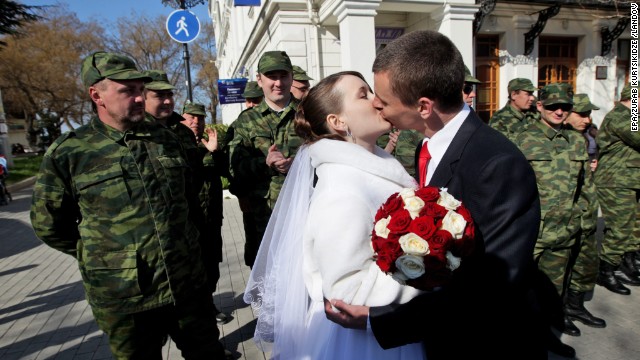 Members of a pro-Russian self-defense unit watch and applaud as a groom and a bride share a kiss at the central square of Sevastopol, Crimea, on Saturday, March 15.
Members of a pro-Russian self-defense unit watch and applaud as a groom and a bride share a kiss at the central square of Sevastopol, Crimea, on Saturday, March 15.  A pro-Russian soldier guards the perimeter outside an Ukrainian military base in Perevalne on March 15. Perevalne is on the Crimean Peninsula.
A pro-Russian soldier guards the perimeter outside an Ukrainian military base in Perevalne on March 15. Perevalne is on the Crimean Peninsula.  Two puppies wearing the colors of Ukraine's national flag smell each other during a dog reunion at the Independence Square in Kiev, Ukraine, on March 15.
Two puppies wearing the colors of Ukraine's national flag smell each other during a dog reunion at the Independence Square in Kiev, Ukraine, on March 15. 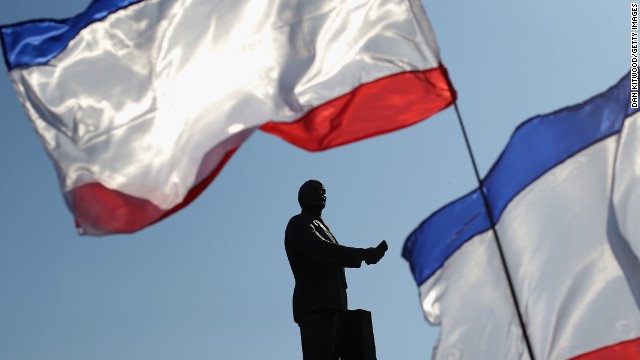 Russian flags wave in front of a monument dedicated to Soviet Union founder Vladimir Lenin during a pro-Russian rally in Lenin Square in Simferopol on March 15.
Russian flags wave in front of a monument dedicated to Soviet Union founder Vladimir Lenin during a pro-Russian rally in Lenin Square in Simferopol on March 15. 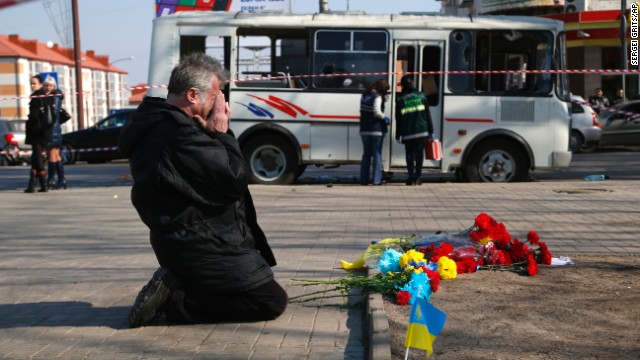 Evgenyi Batyukhov cries on March 14, at the site where pro-Russian and pro-Ukrainian activists clashed the night before in Donetsk, Ukraine.
Evgenyi Batyukhov cries on March 14, at the site where pro-Russian and pro-Ukrainian activists clashed the night before in Donetsk, Ukraine. 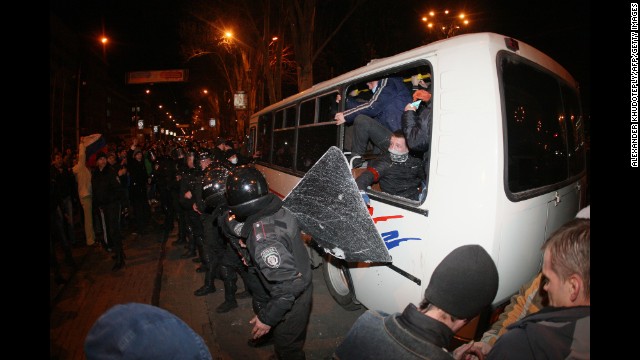 A line of policemen stand in front of a bus of pro-Ukrainian activists as pro-Russian supporters confront them during a rally in Donetsk on Thursday, March 13.
A line of policemen stand in front of a bus of pro-Ukrainian activists as pro-Russian supporters confront them during a rally in Donetsk on Thursday, March 13.  Pro-Russian supporters clash with pro-Ukrainian activists in Donetsk on March 13.
Pro-Russian supporters clash with pro-Ukrainian activists in Donetsk on March 13.  Recent Academy Award winner Jared Leto walks through Independence Square in Kiev, Ukraine, on March 13. During his Oscars acceptance speech in early March, the actor spoke to protesters in Ukraine and Venezuela saying, "We're thinking of you tonight."
Recent Academy Award winner Jared Leto walks through Independence Square in Kiev, Ukraine, on March 13. During his Oscars acceptance speech in early March, the actor spoke to protesters in Ukraine and Venezuela saying, "We're thinking of you tonight."  A member of a pro-Russian self-defense unit checks a polling station near Simferopol, Ukraine, on March 13.
A member of a pro-Russian self-defense unit checks a polling station near Simferopol, Ukraine, on March 13.  A Ukrainian soldier looks out of the window of a regional military building with a poster reading "Ukraine's armed forces wait for you!" in Donetsk on March 13.
A Ukrainian soldier looks out of the window of a regional military building with a poster reading "Ukraine's armed forces wait for you!" in Donetsk on March 13. 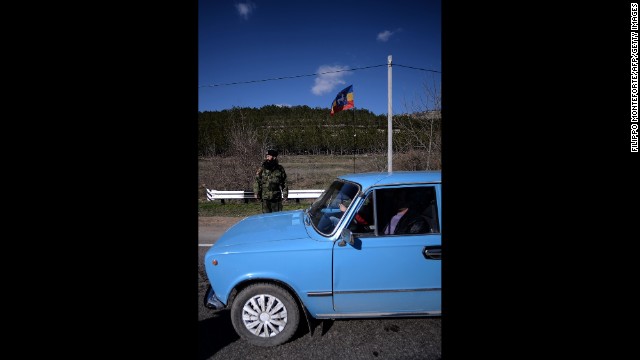 An armed Cossack stands guard at a checkpoint on the road from Simferopol to Sevastopol on March 13. Security measures are tightening around Simferopol, Crimea's capital, as the pro-Russian regional government prepares to hold a referendum to break away from Ukraine. The standoff has revived concerns of a return to Cold War relations.
An armed Cossack stands guard at a checkpoint on the road from Simferopol to Sevastopol on March 13. Security measures are tightening around Simferopol, Crimea's capital, as the pro-Russian regional government prepares to hold a referendum to break away from Ukraine. The standoff has revived concerns of a return to Cold War relations.  A pro-Russian soldier speaks to a truck driver outside the Ukrainian infantry base in Perevalne, a village in Crimea, on Wednesday, March 12.
A pro-Russian soldier speaks to a truck driver outside the Ukrainian infantry base in Perevalne, a village in Crimea, on Wednesday, March 12. 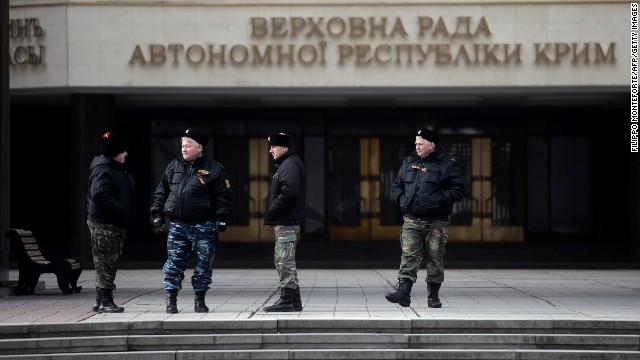 Cossacks stand guard at Crimea's regional parliament building in Simferopol on March 12.
Cossacks stand guard at Crimea's regional parliament building in Simferopol on March 12. 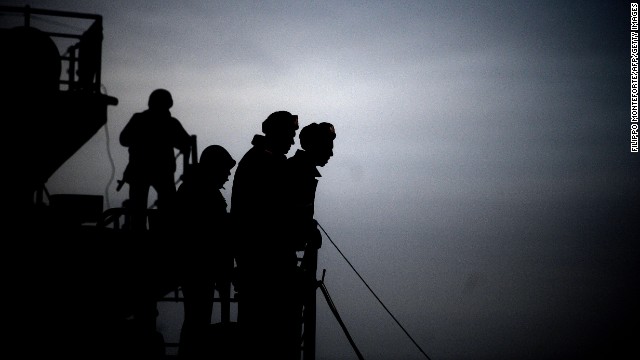 Soldiers are seen aboard the Ukrainian ship Slavutych in the harbor of Sevastopol on Tuesday, March 11.
Soldiers are seen aboard the Ukrainian ship Slavutych in the harbor of Sevastopol on Tuesday, March 11.  Ukrainian naval officers board a boat in front of the Russian minesweeper Turbinist in Sevastopol's harbor on March 11.
Ukrainian naval officers board a boat in front of the Russian minesweeper Turbinist in Sevastopol's harbor on March 11. 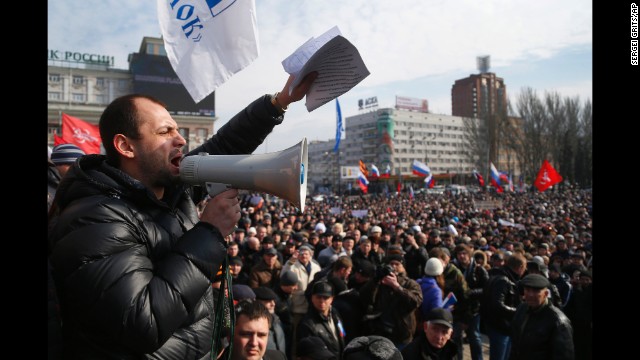 People shout slogans during a pro-Russia rally in Donetsk on Sunday, March 9.
People shout slogans during a pro-Russia rally in Donetsk on Sunday, March 9.  Ukrainian police detain a demonstrator during a pro-Russian rally in Donetsk on March 9.
Ukrainian police detain a demonstrator during a pro-Russian rally in Donetsk on March 9.  Pro-Russia protesters remove a Ukrainian flag from a flagpole taken from a government building in Donetsk on March 9.
Pro-Russia protesters remove a Ukrainian flag from a flagpole taken from a government building in Donetsk on March 9.  Cossacks and other pro-Russian forces stand guard outside a government building in Simferopol on Saturday, March 8.
Cossacks and other pro-Russian forces stand guard outside a government building in Simferopol on Saturday, March 8.  Ukrainian soldiers load armored personnel carriers into boxcars in the western Ukrainian city of Lviv on March 8.
Ukrainian soldiers load armored personnel carriers into boxcars in the western Ukrainian city of Lviv on March 8.  Armed men believed to be Russian military march in a village outside Simferopol on Friday, March 7.
Armed men believed to be Russian military march in a village outside Simferopol on Friday, March 7.  Pro-Russia protesters demonstrate outside the Belbek air base, near Sevastopol, on Thursday, March 6.
Pro-Russia protesters demonstrate outside the Belbek air base, near Sevastopol, on Thursday, March 6.  A Ukrainian navy officer looks at the scuttled, decommissioned Russian vessel Ochakov from the Black Sea shore outside the town of Myrnyi, Ukraine, on March 6. Russian naval personnel scuttled the ship, blockading access for five Ukrainian naval vessels.
A Ukrainian navy officer looks at the scuttled, decommissioned Russian vessel Ochakov from the Black Sea shore outside the town of Myrnyi, Ukraine, on March 6. Russian naval personnel scuttled the ship, blockading access for five Ukrainian naval vessels.  A member of the Russian military patrols around Perevalne on March 6.
A member of the Russian military patrols around Perevalne on March 6.  Servicemen guard a checkpoint at a Ukrainian navy base in Perevalne on March 6.
Servicemen guard a checkpoint at a Ukrainian navy base in Perevalne on March 6.  Ukrainian troops guard the Belbek air base on March 6.
Ukrainian troops guard the Belbek air base on March 6.  A woman walks past barricades March 6 that were set up by anti-government protesters in Kiev's Independence Square.
A woman walks past barricades March 6 that were set up by anti-government protesters in Kiev's Independence Square.  A sailor guards the Ukrainian Navy ship Slavutych in the Bay of Sevastopol on Wednesday, March 5.
A sailor guards the Ukrainian Navy ship Slavutych in the Bay of Sevastopol on Wednesday, March 5. 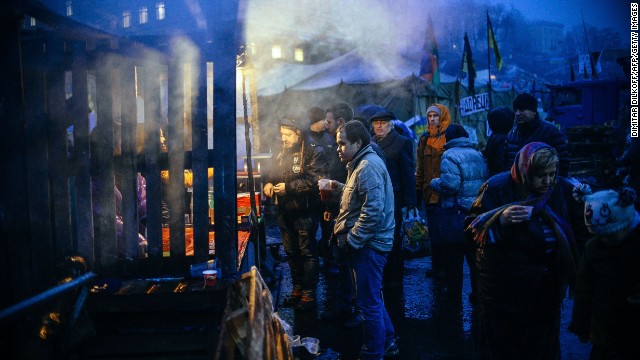 People wait in line for food distribution in Independence Square on March 5.
People wait in line for food distribution in Independence Square on March 5. 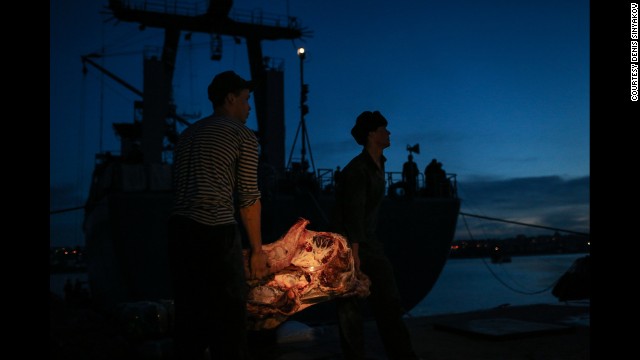 Ukrainian sailors carry meat to their vessel in the Sevastopol harbor on March 5.
Ukrainian sailors carry meat to their vessel in the Sevastopol harbor on March 5.  Riot police stand at the entrance of a regional administrative building during a rally in Donetsk on March 5.
Riot police stand at the entrance of a regional administrative building during a rally in Donetsk on March 5.  A Ukrainian police officer gives instructions to members of the media in front of the business class lounge of the Simferopol airport on March 5.
A Ukrainian police officer gives instructions to members of the media in front of the business class lounge of the Simferopol airport on March 5.  Pro-Russia demonstrators wave a Russian flag after storming a regional administrative building in Donetsk on March 5.
Pro-Russia demonstrators wave a Russian flag after storming a regional administrative building in Donetsk on March 5.  Demonstrators break a police barrier as they storm a regional administrative building in Donetsk on March 5.
Demonstrators break a police barrier as they storm a regional administrative building in Donetsk on March 5.  Ukrainian military recruits line up to receive instructions in Kiev's Independence Square on Tuesday, March 4.
Ukrainian military recruits line up to receive instructions in Kiev's Independence Square on Tuesday, March 4.  People stand on the Ukrainian Navy ship Slavutych while it's at harbor in Sevastopol on March 4. Mattresses were placed over the side of the ship to hinder any attempted assault.
People stand on the Ukrainian Navy ship Slavutych while it's at harbor in Sevastopol on March 4. Mattresses were placed over the side of the ship to hinder any attempted assault.  Ukrainian troops watch as a Russian navy ship blocks the entrance of the Ukrainian navy base in Sevastopol on March 4.
Ukrainian troops watch as a Russian navy ship blocks the entrance of the Ukrainian navy base in Sevastopol on March 4.  A woman photographs pro-Russian soldiers guarding Ukraine's infantry base in Perevalne on March 4.
A woman photographs pro-Russian soldiers guarding Ukraine's infantry base in Perevalne on March 4.  U.S. Secretary of State John Kerry, wearing a blue scarf, visits a shrine March 4 for the people who were killed in February during anti-government protests in Kiev.
U.S. Secretary of State John Kerry, wearing a blue scarf, visits a shrine March 4 for the people who were killed in February during anti-government protests in Kiev.  Yuli Mamchun, the commander of the Ukrainian military garrison at the Belbek air base near Sevastopol, salutes on March 4.
Yuli Mamchun, the commander of the Ukrainian military garrison at the Belbek air base near Sevastopol, salutes on March 4.  Russian soldiers stand guard at the Belbek air base on March 4.
Russian soldiers stand guard at the Belbek air base on March 4.  Ukrainian military members march at the Belbek air base on March 4.
Ukrainian military members march at the Belbek air base on March 4.  Russian soldiers fire warning shots to keep back Ukrainian military members at the Belbek air base on March 4.
Russian soldiers fire warning shots to keep back Ukrainian military members at the Belbek air base on March 4.  A Ukrainian airman puts the Ukrainian national flag over the gate of the Belbek air base as they guard what's left under their control on March 4.
A Ukrainian airman puts the Ukrainian national flag over the gate of the Belbek air base as they guard what's left under their control on March 4.  Russian soldiers aim a grenade launcher and machine gun as they guard positions at the Belbek air base on March 4.
Russian soldiers aim a grenade launcher and machine gun as they guard positions at the Belbek air base on March 4.  Ukrainian seamen stand guard on the Ukrainian navy ship Slavutych in the Sevastopol harbor on Monday, March 3.
Ukrainian seamen stand guard on the Ukrainian navy ship Slavutych in the Sevastopol harbor on Monday, March 3.  Oleg, a Ukrainian soldier, kisses his girlfriend, Svetlana, through the gates of the Belbek base entrance on March 3. Tensions are high at the base, where Ukrainian soldiers were standing guard inside the building while alleged Russian gunmen were standing guard outside the gates.
Oleg, a Ukrainian soldier, kisses his girlfriend, Svetlana, through the gates of the Belbek base entrance on March 3. Tensions are high at the base, where Ukrainian soldiers were standing guard inside the building while alleged Russian gunmen were standing guard outside the gates.  Wives of Ukrainian soldiers walk past Russian soldiers to visit their husbands guarding a military base in Perevalne on March 3.
Wives of Ukrainian soldiers walk past Russian soldiers to visit their husbands guarding a military base in Perevalne on March 3.  A Russian soldier guards an area outside Ukraine's military base in the village of Perevalne on March 3.
A Russian soldier guards an area outside Ukraine's military base in the village of Perevalne on March 3.  A sailor looks out a window near the entrance to the Ukrainian navy headquarters in Sevastopol on March 3.
A sailor looks out a window near the entrance to the Ukrainian navy headquarters in Sevastopol on March 3.  Armed men in military uniform walk outside a Ukrainian military unit near Simferopol on Sunday, March 2. Hundreds of armed men in trucks and armored vehicles surrounded the Ukrainian base Sunday in Crimea, blocking its soldiers from leaving.
Armed men in military uniform walk outside a Ukrainian military unit near Simferopol on Sunday, March 2. Hundreds of armed men in trucks and armored vehicles surrounded the Ukrainian base Sunday in Crimea, blocking its soldiers from leaving.  Soldiers walk outside a Ukrainian military base in Perevalne as a local resident waves a Russian flag March 2.
Soldiers walk outside a Ukrainian military base in Perevalne as a local resident waves a Russian flag March 2.  Demonstrators shout during a rally in Kiev's Independence Square on March 2.
Demonstrators shout during a rally in Kiev's Independence Square on March 2.  Ukrainian soldiers, left, and unidentified gunmen, right, stand at the gate of an infantry base in Perevalne on March 2.
Ukrainian soldiers, left, and unidentified gunmen, right, stand at the gate of an infantry base in Perevalne on March 2.  Ukrainian soldiers guard a gate of an infantry base in Perevalne on March 2.
Ukrainian soldiers guard a gate of an infantry base in Perevalne on March 2.  A woman cries during a rally in Independence Square on March 2.
A woman cries during a rally in Independence Square on March 2.  Protesters hold flags of the United States, Germany and Italy during a rally in Independence Square on March 2.
Protesters hold flags of the United States, Germany and Italy during a rally in Independence Square on March 2.  People attend a morning prayer service at Independence Square on March 2.
People attend a morning prayer service at Independence Square on March 2.  A soldier and a truck driver unload bread outside the Ukranian navy headquarters in Sevastopol on March 2.
A soldier and a truck driver unload bread outside the Ukranian navy headquarters in Sevastopol on March 2.  Heavily armed troops, displaying no identifying insignia and who were mingling with local pro-Russian militants, stand guard outside a local government building in Simferopol on March 2.
Heavily armed troops, displaying no identifying insignia and who were mingling with local pro-Russian militants, stand guard outside a local government building in Simferopol on March 2. 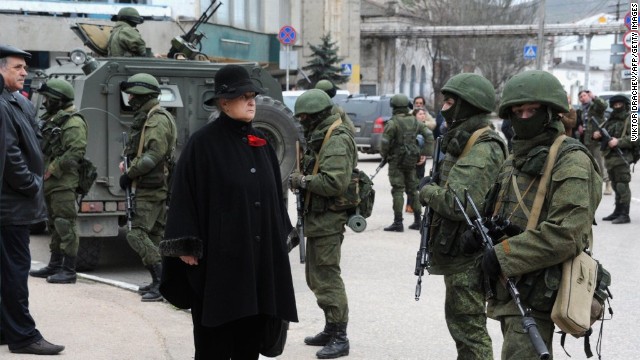 A woman waits in front of unidentified men in military fatigues who were blocking a base of the Ukrainian frontier guard unit in Balaklava, Ukraine, on Saturday, March 1.
A woman waits in front of unidentified men in military fatigues who were blocking a base of the Ukrainian frontier guard unit in Balaklava, Ukraine, on Saturday, March 1. 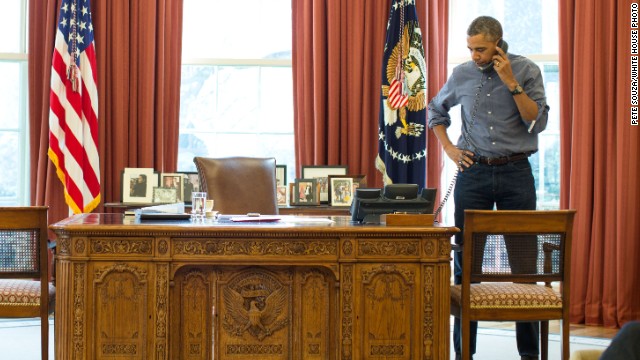 U.S. President Barack Obama, in the Oval Office of the White House, talks on the phone March 1 with Russian President Vladimir Putin.
U.S. President Barack Obama, in the Oval Office of the White House, talks on the phone March 1 with Russian President Vladimir Putin. 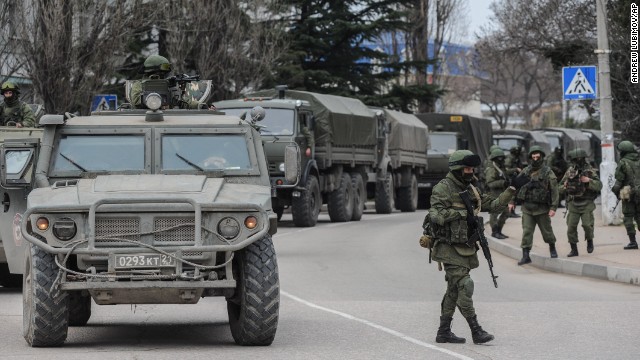 Troops stand guard in Balaklava on March 1.
Troops stand guard in Balaklava on March 1. 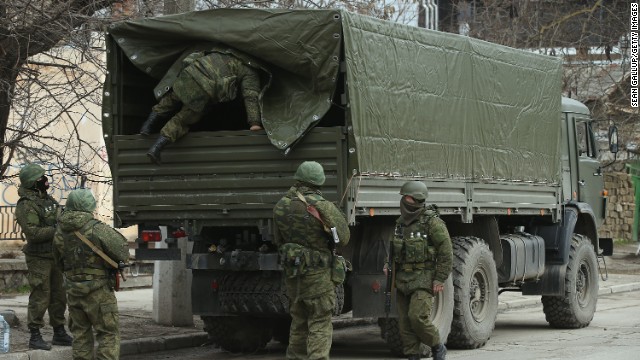 Heavily armed soldiers displaying no identifying insignia maintain watch in Simferopol on March 1.
Heavily armed soldiers displaying no identifying insignia maintain watch in Simferopol on March 1. 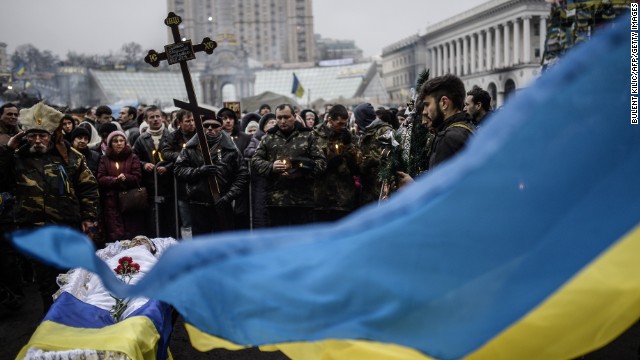 People gather around the coffin of a man who was killed during clashes with riot police in Independence Square.
People gather around the coffin of a man who was killed during clashes with riot police in Independence Square.  Pro-Russian activists hold Russian flags during a rally in the center of Donetsk on March 1.
Pro-Russian activists hold Russian flags during a rally in the center of Donetsk on March 1. 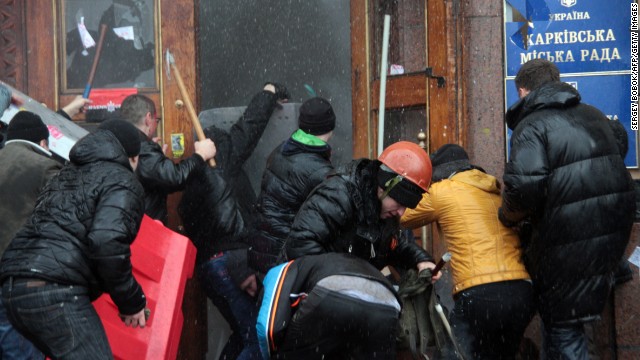 Pro-Russian activists clash with Maidan supporters as they storm the regional government building in Kharkiv, Ukraine, on March 1.
Pro-Russian activists clash with Maidan supporters as they storm the regional government building in Kharkiv, Ukraine, on March 1. 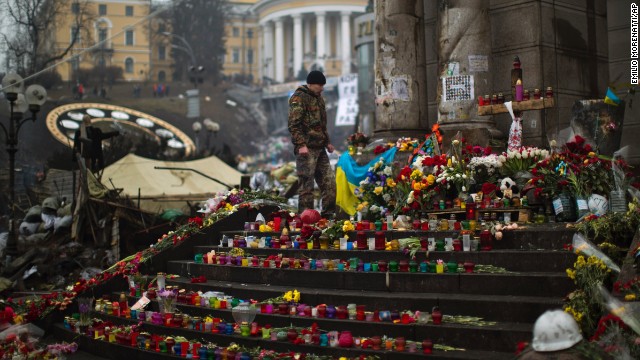 A protester stands at a memorial March 1 for the people killed in clashes at Independence Square.
A protester stands at a memorial March 1 for the people killed in clashes at Independence Square. 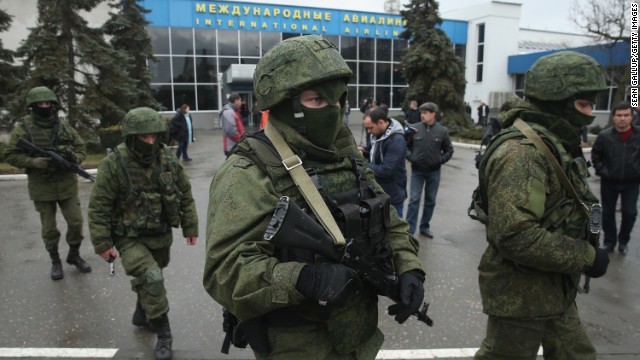 Armed men patrol outside the Simferopol International Airport on Friday, February 28.
Armed men patrol outside the Simferopol International Airport on Friday, February 28. 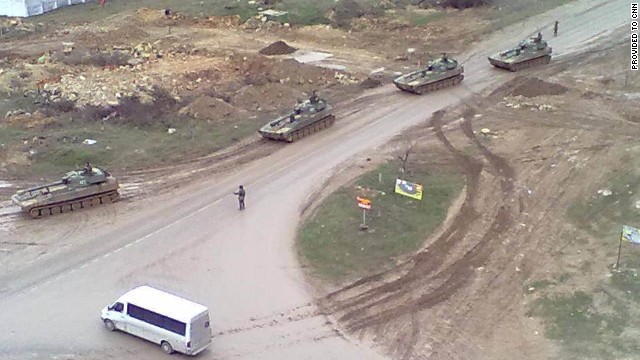 An image provided to CNN by a local resident shows Russian tanks on the move in Sevastopol.
An image provided to CNN by a local resident shows Russian tanks on the move in Sevastopol. 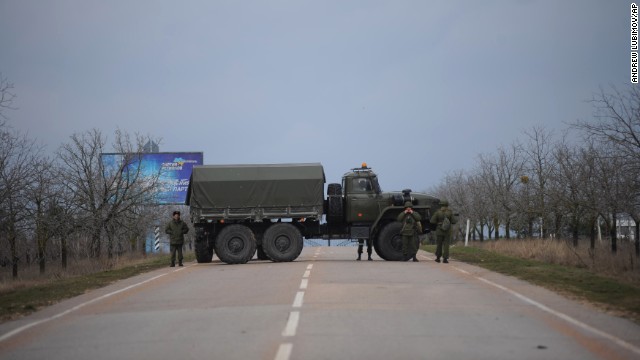 Russian troops block a road February 28 toward the military airport in Sevastopol. The Russian Black Sea Fleet is based at the port city.
Russian troops block a road February 28 toward the military airport in Sevastopol. The Russian Black Sea Fleet is based at the port city. 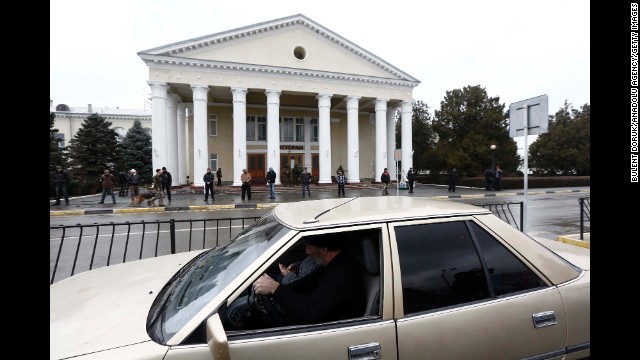 Armed men stand guard in front of a building near the Simferopol airport on February 28.
Armed men stand guard in front of a building near the Simferopol airport on February 28. 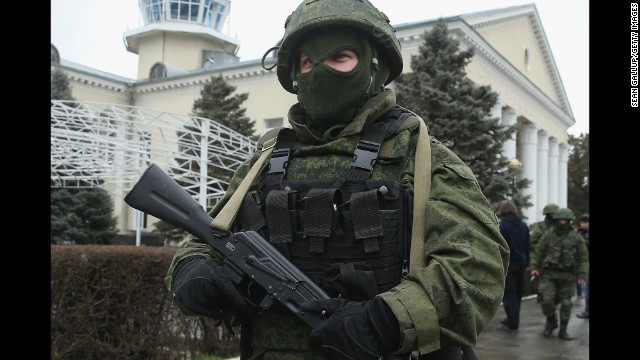 An armed man wearing no identifying insignia patrols outside Simferopol International Airport on February 28.
An armed man wearing no identifying insignia patrols outside Simferopol International Airport on February 28. 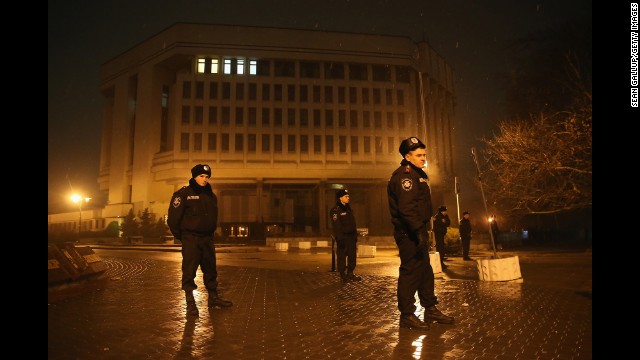 Police stand guard outside the Crimea regional parliament building Thursday, February 27, in Simferopol. Armed men seized the regional government administration building and parliament in Crimea.
Police stand guard outside the Crimea regional parliament building Thursday, February 27, in Simferopol. Armed men seized the regional government administration building and parliament in Crimea. 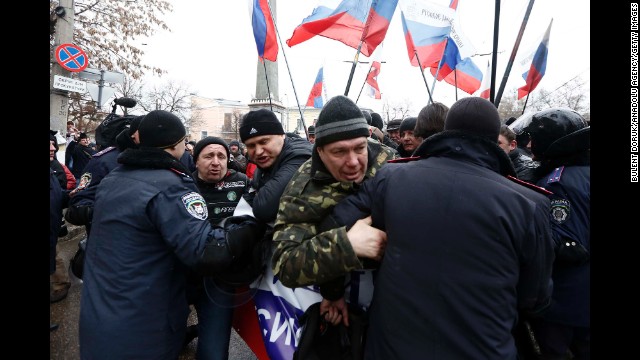 Police intervene as Russian supporters gather in front of the parliament building in Simferopol on February 27.
Police intervene as Russian supporters gather in front of the parliament building in Simferopol on February 27. 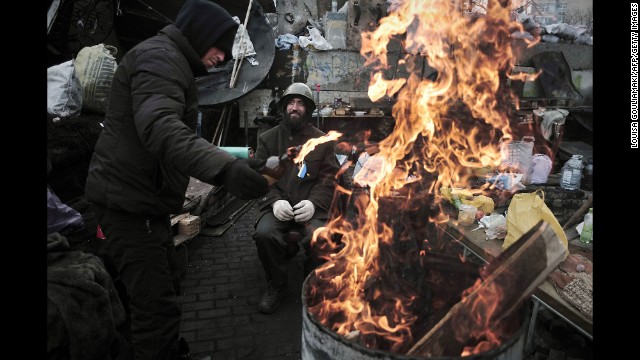 A man adds fuel to a fire at a barricade in Independence Square on February 27. Dozens of people were killed during clashes between security forces and protesters.
A man adds fuel to a fire at a barricade in Independence Square on February 27. Dozens of people were killed during clashes between security forces and protesters. 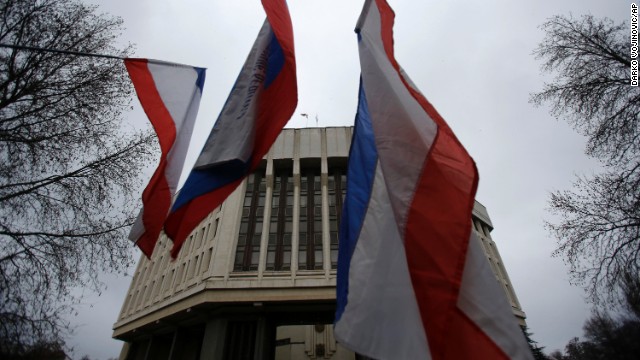 Pro-Russia demonstrators wave Russian and Crimean flags in front of a local government building in Simferopol on February 27.
Pro-Russia demonstrators wave Russian and Crimean flags in front of a local government building in Simferopol on February 27.  Barricades in front of a government building in Simferopol on February 27 hold a banner that reads: "Crimea Russia." There's a broad divide between those who support the pro-Western developments in Kiev and those who back Russia's continued influence in Crimea and across Ukraine.
Barricades in front of a government building in Simferopol on February 27 hold a banner that reads: "Crimea Russia." There's a broad divide between those who support the pro-Western developments in Kiev and those who back Russia's continued influence in Crimea and across Ukraine. 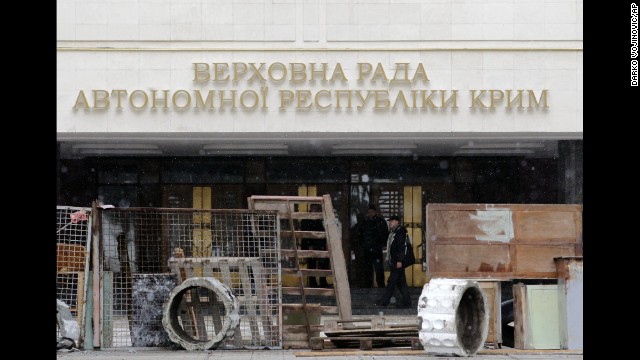 Protesters stand in front of a government building in Simferopol on February 27. Tensions have simmered in the Crimea region since the ouster of Ukrainian President Viktor Yanukovych.
Protesters stand in front of a government building in Simferopol on February 27. Tensions have simmered in the Crimea region since the ouster of Ukrainian President Viktor Yanukovych. 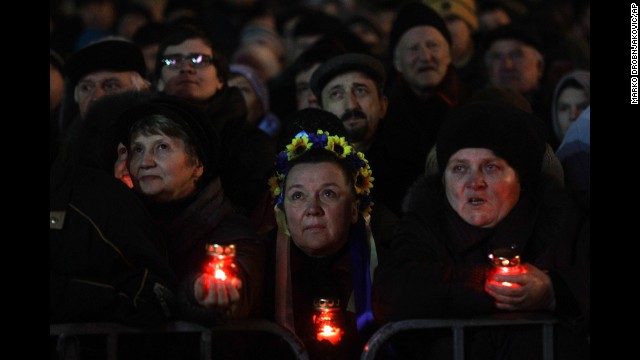 Protesters in support of the president's ouster rally in Independence Square, which has been the center of opposition, on Wednesday, February 26.
Protesters in support of the president's ouster rally in Independence Square, which has been the center of opposition, on Wednesday, February 26. 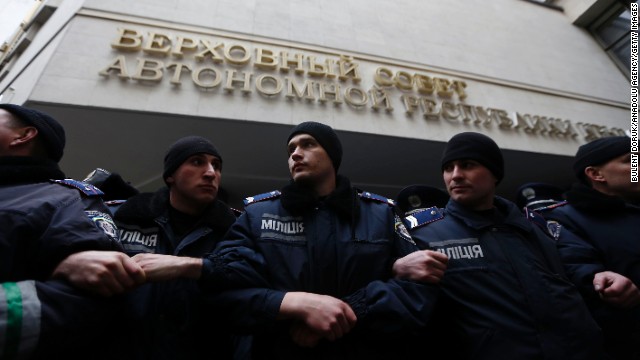 Security forces stand guard during clashes between opposing sides in front of Crimea's parliament building in Simferopol on February 26.
Security forces stand guard during clashes between opposing sides in front of Crimea's parliament building in Simferopol on February 26. 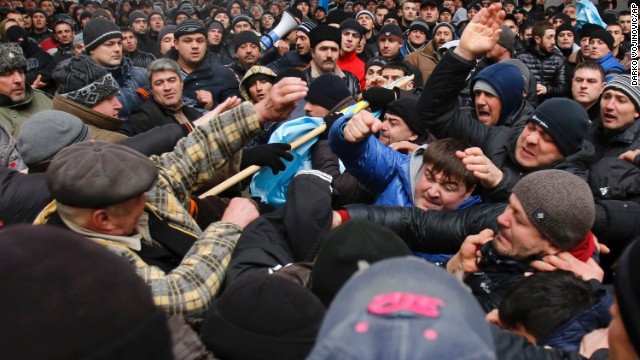 Pro-Russian demonstrators, right, clash with anti-Russian protesters in front of a government building in Simferopol on February 26.
Pro-Russian demonstrators, right, clash with anti-Russian protesters in front of a government building in Simferopol on February 26. 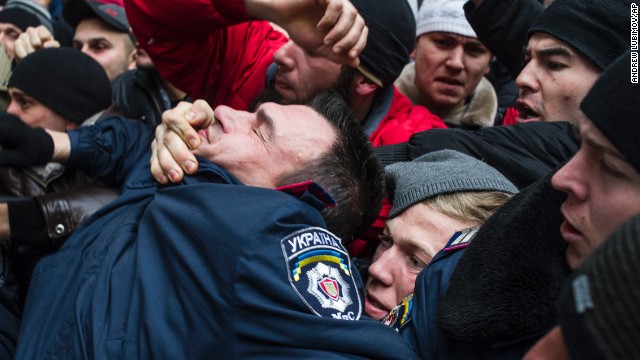 A police officer gets pulled into a crowd of Crimean Tatars in Simferopol on February 26. The Tatars, an ethnic minority group deported during the Stalin era, rallied in support of Ukraine's interim government.
A police officer gets pulled into a crowd of Crimean Tatars in Simferopol on February 26. The Tatars, an ethnic minority group deported during the Stalin era, rallied in support of Ukraine's interim government.  A man places flowers at a barricade near Independence Square on February 26.
A man places flowers at a barricade near Independence Square on February 26. 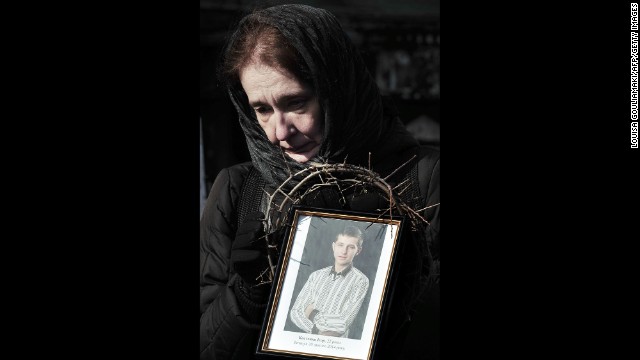 On February 26 in Kiev, a woman holds a photograph of a protester killed during the height of tensions.
On February 26 in Kiev, a woman holds a photograph of a protester killed during the height of tensions. 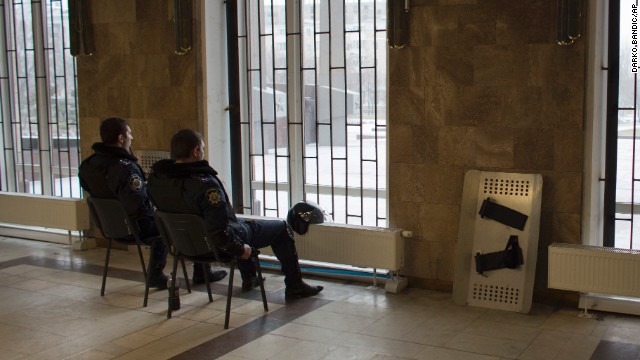 Police guard a government building in Donetsk on February 26.
Police guard a government building in Donetsk on February 26.  Protesters remove a fence that surrounds Ukraine's parliament in Kiev on February 26.
Protesters remove a fence that surrounds Ukraine's parliament in Kiev on February 26. 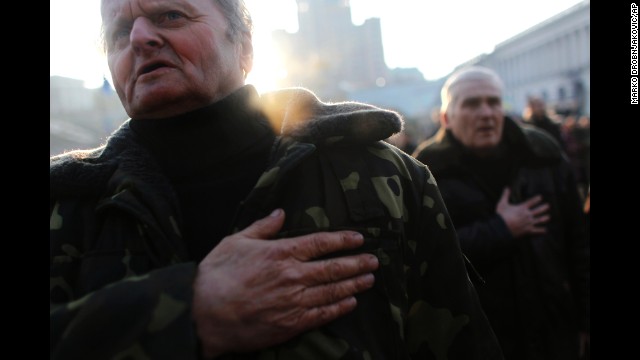 People sing the Ukrainian national anthem at Independence Square on Monday, February 24.
People sing the Ukrainian national anthem at Independence Square on Monday, February 24. 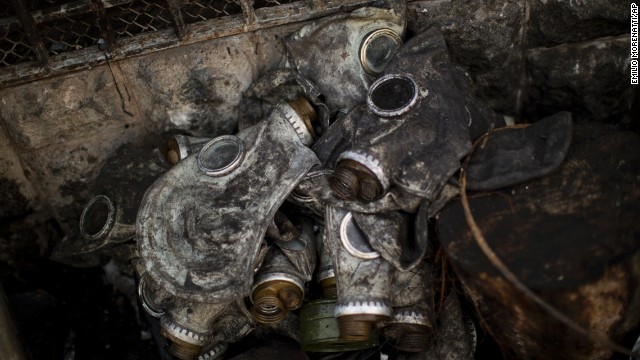 Gas masks used by protesters sit next to a barricade in Independence Square on February 24.
Gas masks used by protesters sit next to a barricade in Independence Square on February 24. 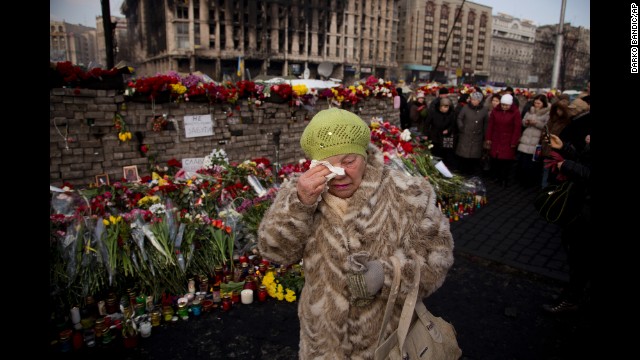 A woman cries February 24 near a memorial for the people killed in Kiev.
A woman cries February 24 near a memorial for the people killed in Kiev. 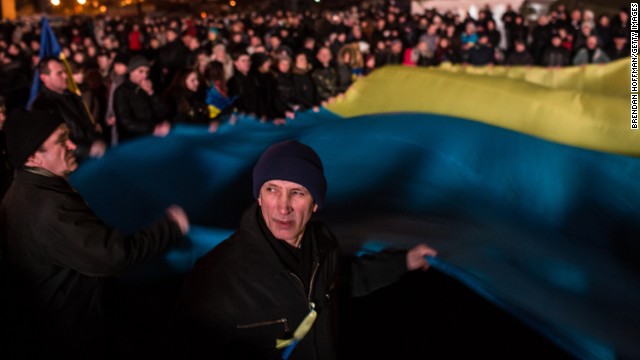 People wave a large Ukrainian flag in Independence Square on Sunday, February 23.
People wave a large Ukrainian flag in Independence Square on Sunday, February 23. 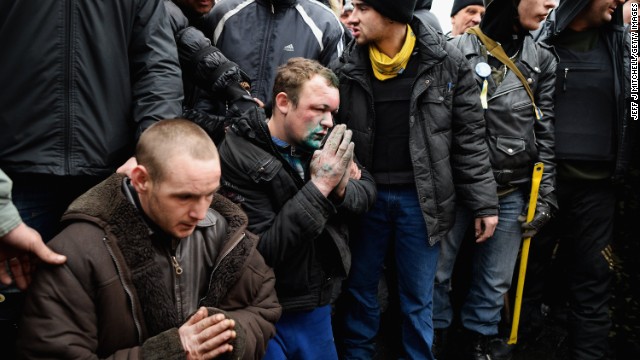 Two pro-government supporters are made to pray February 23 in front of a shrine to dead anti-government protesters.
Two pro-government supporters are made to pray February 23 in front of a shrine to dead anti-government protesters. 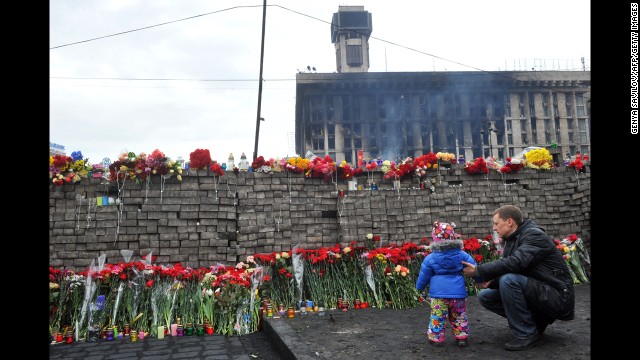 A man and his daughter lay flowers at a memorial for protesters killed in Independence Square.
A man and his daughter lay flowers at a memorial for protesters killed in Independence Square. 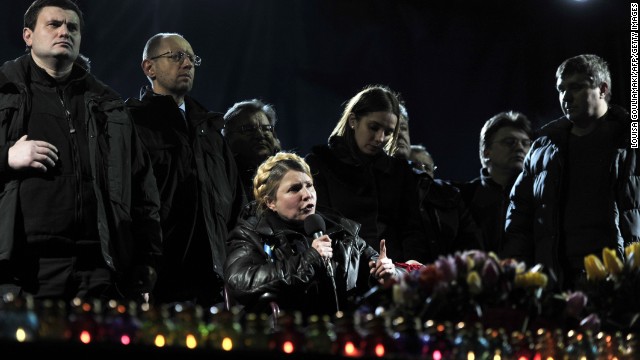 Former Prime Minister Yulia Tymoshenko speaks at Independence Square on Saturday, February 22, hours after being released from prison. Tymoshenko, considered a hero of a 2004 revolution against Yanukovych, was released after 2½ years behind bars.
Former Prime Minister Yulia Tymoshenko speaks at Independence Square on Saturday, February 22, hours after being released from prison. Tymoshenko, considered a hero of a 2004 revolution against Yanukovych, was released after 2½ years behind bars. 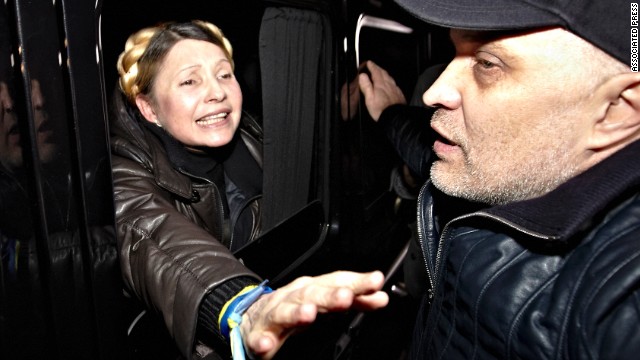 Tymoshenko is greeted by supporters shortly after being freed from prison in Kharkiv on February 22.
Tymoshenko is greeted by supporters shortly after being freed from prison in Kharkiv on February 22. 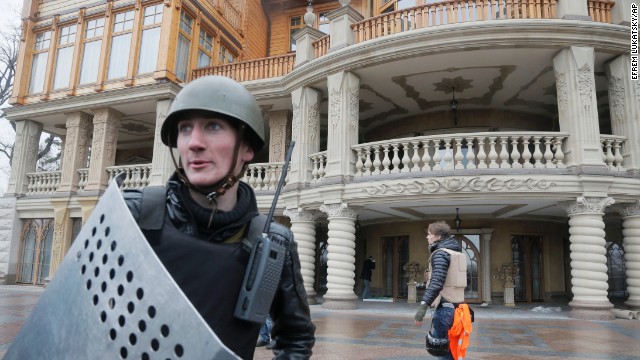 A protester guards the entrance to Yanukovych's abandoned residence outside Kiev on February 22.
A protester guards the entrance to Yanukovych's abandoned residence outside Kiev on February 22. 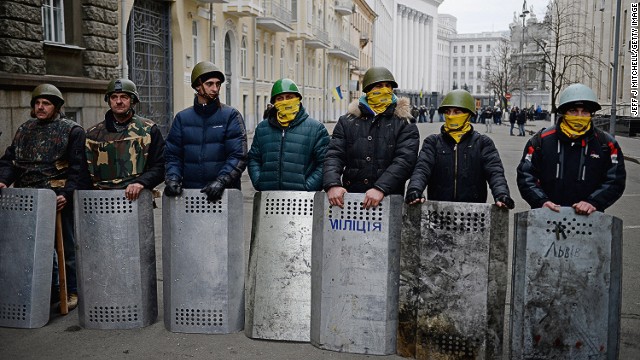 Anti-government protesters guard the streets next to the presidential offices in Kiev on February 22.
Anti-government protesters guard the streets next to the presidential offices in Kiev on February 22.  Anti-government protesters drive a military vehicle in Independence Square on February 22. Many protesters said they wouldn't leave the square until Yanukovych resigned.
Anti-government protesters drive a military vehicle in Independence Square on February 22. Many protesters said they wouldn't leave the square until Yanukovych resigned. 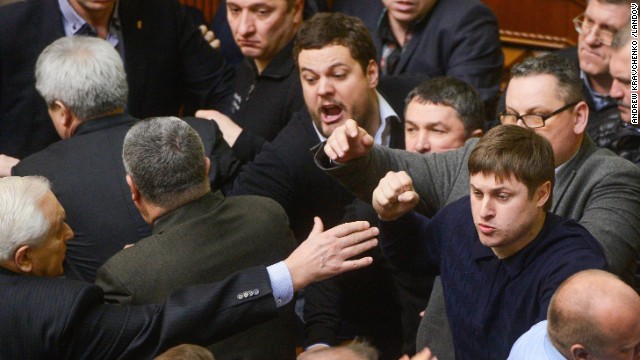 Ukrainian lawmakers argue during a session of Parliament on Friday, February 21.
Ukrainian lawmakers argue during a session of Parliament on Friday, February 21. 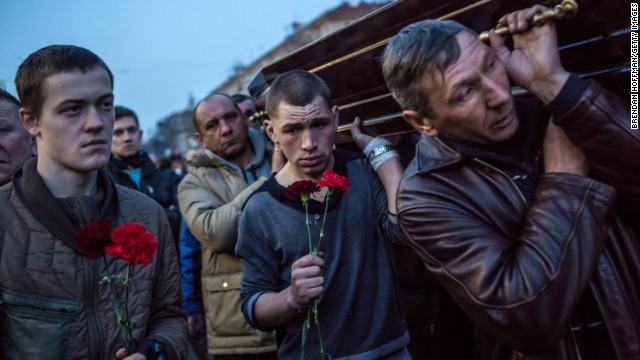 Men in Kiev carry a casket containing the body of a protester killed in clashes with police.
Men in Kiev carry a casket containing the body of a protester killed in clashes with police. 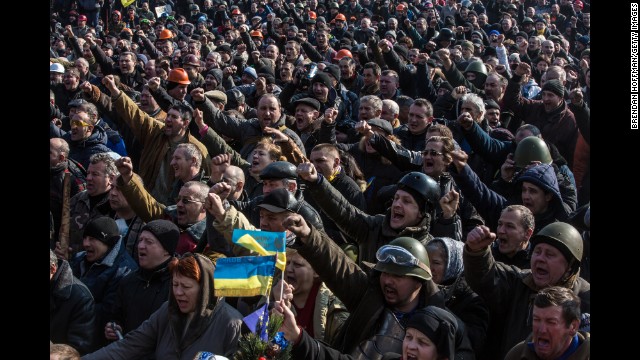 Protesters cheer after news of an agreement between the opposing sides in Kiev on February 21.
Protesters cheer after news of an agreement between the opposing sides in Kiev on February 21.
- Gingrich, Graham: U.S. has protested but hasn't gone beyond symbolic measures
- They say Obama's meeting with Ukrainian leader and Kerry's condemnation aren't sufficient
- Authors: U.S. should have accepted Ukraine's emergency request for military aid
- They say it is crucial to send a message that the U.S. will respond strongly to aggression
Editor's note: Sen. Lindsey Graham is a Republican from South Carolina. Newt Gingrich is a co-host of CNN's which airs at 6:30 p.m. ET weekdays. A former speaker of the House, he was a candidate in the 2012 Republican presidential primaries.
(CNN) -- America's response to the most dangerous security crisis Europe has faced in decades has been all speeches and symbolism with no actions of substance.
On Wednesday, President Barack Obama hosted Arseniy Yatsenyuk, the new interim Ukrainian Prime Minister, for lunch at the White House, supposedly a thumb in the eye of Russian President Vladimir Putin and a sign of America's commitment to Ukrainian sovereignty.
On Thursday, Secretary of State John Kerry announced that the U.S. will take "very serious" steps if Russia does not back down by Monday from its attempt to annex Crimea.
But while the White House was serving lunch and the State Department was issuing stern warnings, the President was also refusing to lift a finger to actually deter Putin's aggression. According to The Wall Street Journal, the Obama administration, "wary of inflaming tensions with Russia," has refused to act on Ukraine's emergency request for military aid, including arms and ammunition, except to send military rations.
Officials in Kiev estimate that Putin has amassed 80,000 Russian troops on the Ukrainian border, and we are worried about "inflaming tensions"? When will the administration put its might where its mouth is: When Kiev is in flames? Or never?
As for Yatsenyuk, whose visit symbolized our solidarity, well Obama hopes you had a nice dessert, because we're not going to give your country the weapons it needs to defend itself.
Theodore Roosevelt is famous for a foreign policy he summarized as "speak softly and carry a big stick." Obama's foreign policy is closer to "scream loudly and carry no stick."
It's no wonder Putin has concluded that he's unlikely to face serious consequences for his imperial adventure. The U.S. did nothing when he invaded Georgia in 2008. More recently, we did nothing after the Syrian regime violated the "red line" Obama had established regarding the use of chemical weapons there. (Recall Kerry's offhand reference to inspections became the pretext a day later for backing off the pledge.)
 McCain calls for U.S. support to Ukraine
McCain calls for U.S. support to Ukraine Putin doesn't take the words of Obama or Kerry seriously because their words aren't serious. The speeches are gestures -- much like the President's Wednesday luncheon -- and their relationship to action is nonexistent, as the administration's refusal of Ukraine's aid request makes quite clear.
The fact is anything short of providing arms and intelligence to the sovereign Ukrainian government is unlikely to deter Putin. Clearly, we do not need American boots on the ground in Ukraine, a step we would both oppose. But if the U.S. wants to stop Russia's dangerous incursion into Eastern Europe, we have to raise the cost. Not just talk about potentially raising the cost at some point in the future once Russia has swallowed half of Ukraine and stationed tens of thousands of troops there.
Unless the President is willing to back up his words with military aid, he's not serious about stopping Putin's armed aggression.
In addition, the President should immediately issue an executive order approving the export of American natural gas to 20 countries that are awaiting bureaucratic approval. The highest priority should go to approving exports to Europe, where in many places, Russia has a near-monopoly on natural gas.
Furthermore, the President should issue an executive order approving 24 pending liquefied natural gas facilities that have been delayed by bureaucratic red tape.
This would be a serious blow to the Russian economy that would impose a real cost on Putin's foray into Ukraine. National emergencies justify actions that would not be taken in quiet times. A Russian invasion of Ukraine will create conditions that the President himself in his first executive order about sanctions called a national emergency.
No one should doubt the seriousness of the events in Eastern Europe.
Russia is threatening to forcibly take over the territory of a sovereign state. Taking over Crimea, which was historically Russian and has a substantial Russian majority, has already been described by Obama and Kerry as unacceptable and very dangerous. Russian occupation of the rest of Ukraine would be a vastly more threatening and more aggressive action.
The situation calls for more than talk. If Putin discovers that once again the West will do nothing to stop his aggression, he might be reckless enough to test our resolve in Latvia, Lithuania or Estonia -- NATO members that we are bound to protect with military force. Trouble there could "reset" us right back to direct warfare with Russia. That would be a disaster and very, very dangerous.
It's past time for the United States to help Ukraine.
Indeed, passivity is the path most likely to lead to war. The Obama administration should grant the request for military aid immediately -- before it's too late for deterrence.
Follow us on Twitter @CNNOpinion.
Join us on Facebook/CNNOpinion.
The opinions expressed in this commentary are solely those of the authors.
No comments:
Post a Comment